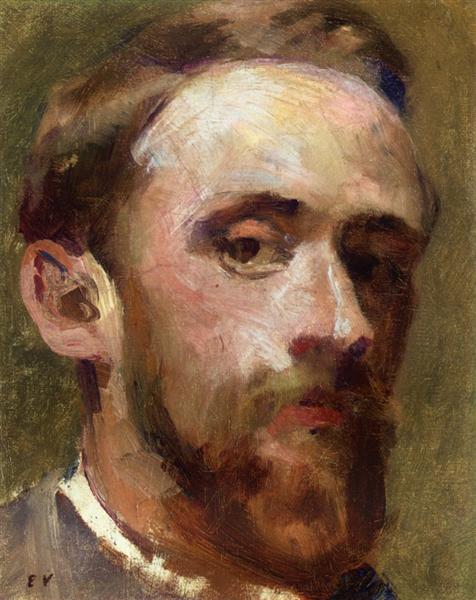Description
The 1888 self -portrait of Édouard Vuillard stands as an emblematic work that encapsulates both the introspection of the artist and the stylistic transition that characterizes the end of the 19th century. In this painting, Vuillard introduces himself in a way that evokes a deep emotional connection with his observers. In a first glance, the composition is revealed as a delicate balance between the figure of the artist and the surrounding environment, which are intertwined almost symbiotically.
The figure of Vuillard is represented standing, in a gesture of taking possession of space, which emphasizes its uniqueness and its role as a creator. The disposition of his body and his gaze, which seems to go to the viewer, establishes a relationship of complicity, where the observer is invited to enter his personal world. The choice of the background, which presents abstract patterns and decorative details, suggests the influence of symbolism and decorative art that Vuillard deepened throughout his career. This approach not only reinforces the intimacy of the representation, but also blurs the borders between the human figure and the environment, highlighting the inherent connection between the subject and its context.
The color palette used in self -portrait is particularly notable. Earth's tones predominate, with nuances of brown, green and blue that create a warm and cozy atmosphere. This use of color is based on a pictorial technique that seeks not only the literal representation, but also the evocation of emotions. Vuillard, influenced by the Nabi movement, seeks an inner vision that transcends the limitations of realism, using color symbolically to convey a mood rather than a faithful representation of reality.
As for the influence of its environment, it is important to point out that Vuillard is registered within a tradition that explores private life and the domestic environment, a central concern in his work. The absence of other characters in the painting It is not incidental. Rather, it underlines the artist's loneliness in intimate spaces and reveals an introspection that resonates with the spirit of symbolism, where the interior is prioritized more to the outside, exploring the subject's psychology instead of elaborating an external narrative.
Vuillard's work, often silenced in front of his most prominent contemporaries such as Pierre Bonnard or Henri Matisse, never ceased to be an expressive vehicle of his observations about everyday life. This self -portrait is at the intersection of self -exploration and the search for a personal style, where the familiarity of its own daily rite is filtered through a visual language that moves away from mere representation.
Thus, the self -portrait of 1888 offers a window to the artist's soul, trapped in an instant in which painting becomes an act of personal reflection. It is a palpable example of how Vuillard managed to merge the interior life of the individual with his surroundings, establishing his place within the artistic avant -garde of the late nineteenth century, while he continued to transcend his own time and anticipate the paths of modern art. As we contemplate this work, it becomes a reminder of the power of self -portrait as a means of internal discovery and connection with the public.
KUADROS ©, a famous paint on your wall.
Hand-made oil painting reproductions, with the quality of professional artists and the distinctive seal of KUADROS ©.
Art reproduction service with satisfaction guarantee. If you are not completely satisfied with the replica of your painting, we refund your money 100%.

